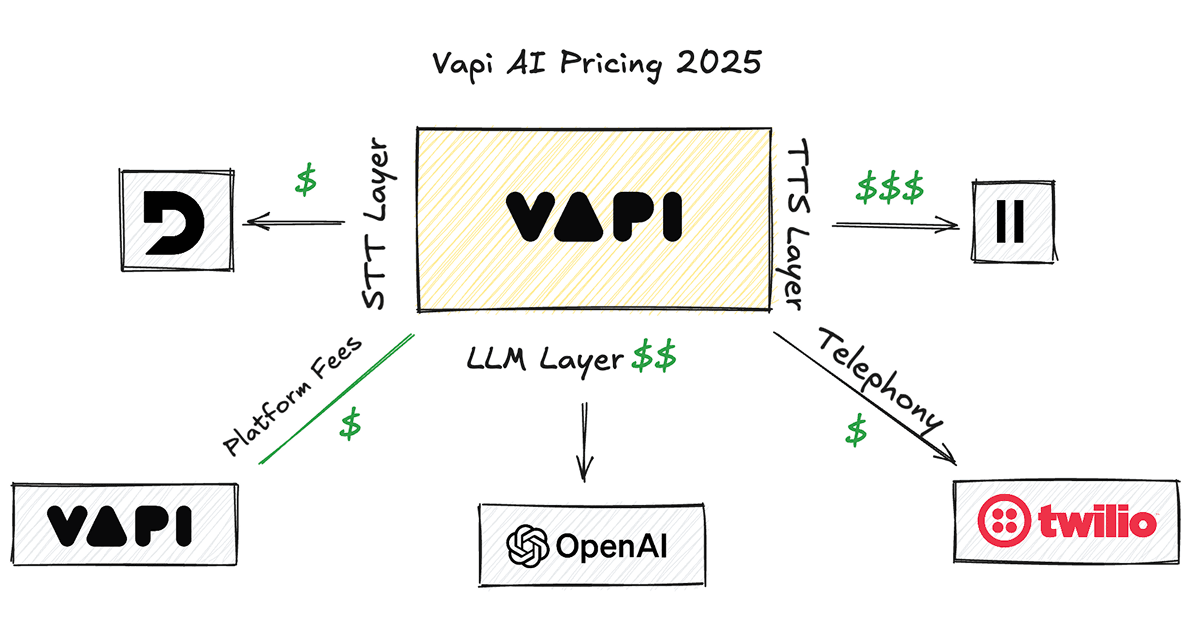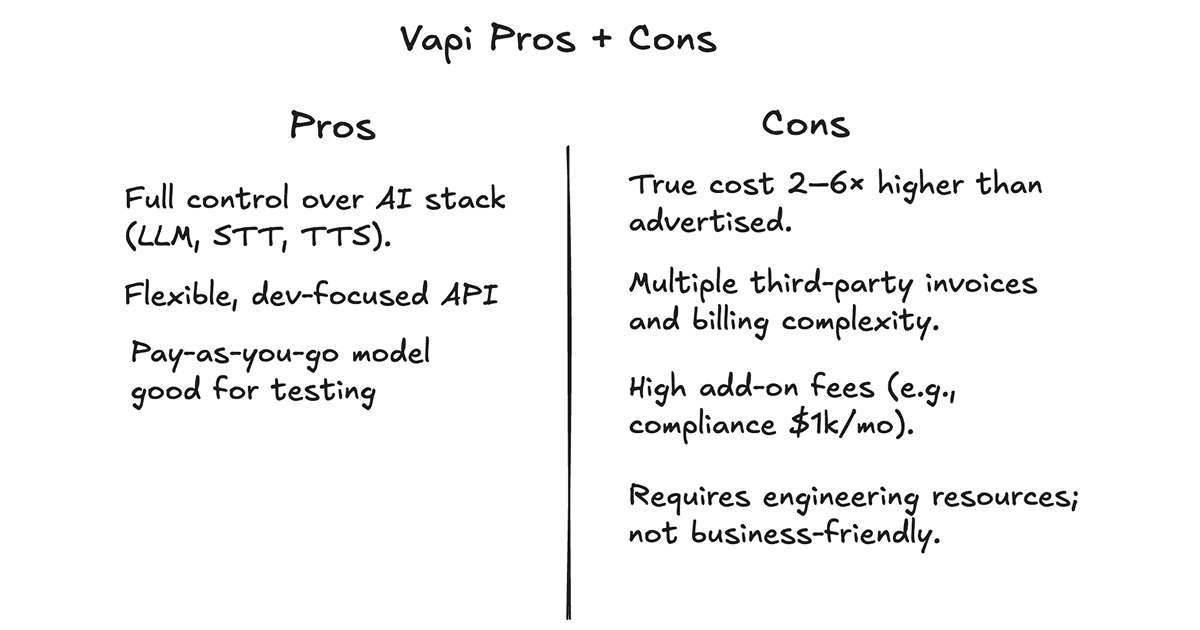Vapi AI Pricing Guide 2025
Choosing the right voice AI platform is critical. You need powerful technology that fits your budget. While Vapi is a popular tool for developers, understanding Vapi pricing can be complicated. Its model relies on multiple external services, which can lead to unpredictable monthly bills and hidden fees.
This guide breaks down the Vapi AI pricing structure for 2025. We will look at the official plans, uncover the hidden costs, and calculate the real price per minute. We will also compare it to a more straightforward alternative, Pod AI, to help you decide which platform offers better value for your business.

What is Vapi AI?
Vapi AI is a platform designed for developers who want to build, test, and deploy voice AI agents. It provides APIs and infrastructure that allow technical teams to create custom conversational flows. Vapi is known for its flexibility, letting you "bring your own" large language models (LLMs), text-to-speech (TTS) voices, and speech-to-text (STT) transcription services.
This developer-first approach gives teams granular control over their AI stack. However, it also means that Vapi itself is just one piece of the puzzle. The responsibility for integrating—and paying for—all the other necessary components falls on you. This unbundled model is the main reason its pricing can be confusing and expensive.
Vapi AI Pricing Structure Explained
Vapi's official pricing page presents two main tiers: a pay-as-you-go plan for small-scale use and a custom enterprise plan for larger needs. Let's look at what each one includes.
Pay-As-You-Go Plan
This is Vapi's entry-level, usage-based option. It's designed for developers and small projects.
- Vapi Hosting Cost: $0.05 per minute.
- SMS/Chat: $0.005 per message.
- Call Concurrency: Includes 10 concurrent lines. Additional lines cost $10 per line per month.
- Data Retention: 14 days for call history and 30 days for chat history.
- Support: Access to a community Discord and email support.
- Trial: New accounts receive $10 in free credits to start.
Crucially, this plan does not include the costs for the AI models, voices, or transcription. Those are billed separately by third-party providers.
Enterprise Plan
The Enterprise plan is designed for businesses with high call volumes and specific security needs.
- Pricing: Custom annual contract with volume-based discounts.
- Included Services: This plan can bundle costs for models, transcription, and voices.
- Concurrency: Custom limits are included.
- Data Retention: Custom retention policies are available.
- Security & Compliance: Can include SOC 2 and HIPAA compliance as add-ons.
- Support: A dedicated account manager and private Slack channel are included.
The Enterprise plan simplifies billing but often requires a significant annual commitment, with budgets typically ranging from $40,000 to $70,000 per year.
The Hidden Costs: What Vapi Doesn't Bundle
The biggest challenge with Vapi AI pricing in 2025 is its reliance on external services. The advertised $0.05 per minute is only for Vapi's hosting. To build a functional voice agent, you need to pay for several other services, which Vapi passes through "at cost."
The Real Vapi AI Cost Per Minute
Here’s a breakdown of the typical components that make up the true Vapi cost per minute:
- Vapi Hosting Fee ($0.05/min): This is the base platform fee for every minute of a call.
- Transcription (STT) Costs (~$0.01/min): You need a service like Deepgram to convert spoken audio to text.
- LLM Costs (~$0.02 - $0.20/min): This is for the AI "brain," like OpenAI's GPT-4o or Anthropic's Claude. Costs vary widely depending on the model's complexity.
- Voice (TTS) Costs (~$0.04/min): To generate spoken responses, you need a text-to-speech provider like ElevenLabs or PlayHT.
- Telephony Costs (~$0.01/min): This covers the actual phone connection through a provider like Twilio or Vonage.
When you add these up, the actual cost is much higher.
Total Estimated Vapi Cost Per Minute = $0.13 - $0.31+
This multi-part structure means you could receive up to five separate invoices each month just to run one voice agent. This complexity makes budgeting difficult and creates significant overhead for vendor management.
Expensive Add-Ons for Business Needs
Beyond usage costs, critical business features come with hefty price tags:
- HIPAA/SOC 2 Compliance: This is a $1,000 per month add-on for the Pay-As-You-Go plan.
- Priority Support: Dedicated support channels like a private Slack are often reserved for Enterprise customers or require a separate fee.
These extra costs can make Vapi prohibitively expensive for businesses that need secure, reliable, and well-supported solutions.
Is Vapi Free? Understanding the Vapi Free Plan in 2025
A common question is, "Is Vapi free?" The answer is no. There is no perpetual Vapi free plan in 2025.
Vapi offers $10 in free credits to new users. This allows you to test the platform and its capabilities. However, based on the total cost per minute (~$0.13 to $0.31+), these credits will likely cover only 30 to 75 minutes of actual call time. Once the credits are used, you must add a payment method to continue using the service.
This trial is useful for developers testing an API, but it is not a long-term solution for businesses needing to handle real customer interactions like support ticket routing or order management.
Pros and Cons of Vapi's Pricing Model
Vapi's pricing strategy has clear advantages and disadvantages.

Pros
- Flexibility: Developers have complete control to choose their preferred LLM, STT, and TTS providers.
- Granular Control: The API-first approach allows for deep customization of the voice AI stack.
- Pay-for-Use: You only pay for the specific components you use, which can be cost-effective for very small-scale experiments.
Cons
- Unpredictable Costs: Monthly bills can fluctuate wildly based on the usage of five different services.
- Complex Billing: Managing multiple invoices from different vendors is an administrative burden.
- High Total Cost of Ownership (TCO): When all costs are combined, Vapi is often more expensive than all-in-one platforms.
- Expensive Add-Ons: Essential features like compliance and premium support cost extra.
- Requires Technical Expertise: The platform is not designed for non-technical users, increasing reliance on engineering resources.
A Simpler Alternative: Pod AI's Transparent Pricing
For businesses that want the power of voice AI without the complexity and hidden costs, Pod AI offers a clear, all-in-one solution. Our pricing is designed for predictability and value, bundling all the necessary components into one simple monthly plan.
With Pod AI, you don't need to manage multiple vendors or worry about surprise fees. Everything is included:
- Call minutes
- High-quality AI voices and transcription
- AI models
- Platform hosting
- Phone numbers
- CRM and Zapier integrations
- Analytics and call monitoring
Our goal is to make it easy to deploy AI agents for real business tasks, whether it's 24/7 customer support or outbound sales prospecting.
Vapi vs. Pod AI: A Head-to-Head Pricing Comparison
The difference between Vapi and Pod AI becomes clear when you compare their models side-by-side.
| Feature | Vapi AI | Pod AI |
|---|---|---|
| Pricing Model | A la carte (5+ separate costs) | All-in-one, bundled plans |
| Typical Cost/Min | $0.13 - $0.31+ | Starts at $0.08 - $0.15 (all-inclusive) |
| Billing | Multiple monthly invoices | One predictable monthly invoice |
| Setup | Developer-focused, requires coding | No-code builder and optional API access |
| AI Components | Bring your own (billed separately) | Included in all plans |
| Compliance | $1,000/mo add-on for HIPAA/SOC2 | Included in enterprise plans |
| Support | Community forum, email | Dedicated support manager included |
| Best For | Engineering teams needing granular control | Businesses wanting a fast, cost-effective solution |
Image Suggestion: A visually appealing version of the comparison table above.
See a more detailed comparison of Pod AI vs. Vapi.
The Bottom Line: Which Platform Offers Better Value?
Vapi AI is a powerful tool for developers who want to build a voice AI solution from the ground up. Its flexibility is its main selling point. However, this flexibility comes with a significant trade-off: complex, unpredictable, and often high costs. Managing multiple vendors and surprise invoices makes it a challenging choice for businesses that need to scale efficiently.
Pod AI is the stronger alternative for companies focused on results. Our all-in-one platform eliminates the guesswork. With bundled minutes, transparent plans, and no hidden fees, you can accurately budget for your voice AI needs. You can launch a production-ready agent for appointment scheduling or lead qualification in days, not months, without needing a large engineering team.
If you want phone-first AI that just works, scales predictably, and delivers clear ROI, Pod AI is the smarter choice.
TL;DR: Vapi Pricing vs. Pod AI
- Vapi Pricing: Vapi's advertised price of $0.05/min is misleading. The true cost is $0.13 - $0.31+ per minute after adding required third-party services for voice, transcription, and AI models.
- Hidden Costs: Expect multiple monthly invoices and expensive add-ons for essential features like security compliance ($1,000/mo).
- Vapi is for Developers: It offers flexibility but requires significant technical expertise and creates complex vendor management.
- Pod AI is for Businesses: It provides an all-in-one solution with predictable, transparent pricing. All features—voice, AI, transcription, support—are bundled into one simple plan.
- The Better Value: For most businesses, Pod AI offers a lower total cost of ownership, faster deployment, and a much simpler path to automating voice communications.
Frequently Asked Questions (FAQ)
What is the true cost of Vapi AI per minute?
The true Vapi AI cost per minute is typically between $0.13 and $0.31. This includes Vapi's $0.05/min hosting fee plus separate costs for third-party transcription (STT), AI models (LLM), voice synthesis (TTS), and telephony services.
Is Vapi AI free in 2025?
No, Vapi is not free. The Vapi free plan in 2025 is a trial that includes $10 in credits. These credits are quickly consumed, as they must cover the costs of all bundled services, not just Vapi's platform fee.
How does Vapi AI pricing compare to Pod AI?
Vapi pricing is a la carte and complex, resulting in multiple invoices and unpredictable costs. Pod AI pricing is all-inclusive and transparent, bundling all necessary services into one predictable monthly bill, which provides better value and a lower total cost.
Who is Vapi AI best for?
Vapi is best suited for engineering-heavy teams with the resources to manage multiple vendors and the desire for granular control over their voice AI stack. It is not ideal for businesses seeking a simple, cost-effective, and quick-to-deploy solution.
What are the main hidden costs of Vapi?
The main hidden costs are the required third-party services for STT, LLM, and TTS, which are billed separately. Other hidden costs include expensive add-ons for compliance ($1,000/mo for HIPAA/SOC 2) and additional fees for extra concurrent call lines.
